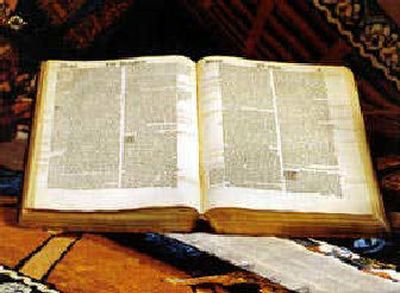Turning to Bibles for divine returns

NEW YORK — More people are turning to the Bible as a safe refuge from a struggling stock market and rising inflation, pouring large sums of cash into rare 1611 King James Bibles, centuries-old Matthew-Tyndale Bible leaves, Hebrew scrolls, prayer books and other ancient liturgical texts.
At Sotheby’s Western Manuscripts sale in London in June, a three-volume, 13th-century Bible in Latin with prologues attributed to Saint Jerome sold for $1.8 million, while an 11th century Bible sold for $164,081, well above the estimate.
Meanwhile, a big U.S. dealer, Greatsite.com, is gearing up for the busy Christmas buying season. The Lake Mary, Fla., firm expects to clear $250,000 a month in sales of rare Bibles, continuing a growth trend that began shortly after the stock market tumbled in 2000.
“The interest in these early religious works is definitely escalating,” says Victor Gulotta, a Newton, Mass., bibliophile who has collected rare books and manuscripts for decades.
It may seem like an unorthodox alternative investment, but collectors say returns can be divine.
That’s chiefly because rare biblical work “is like California coastline real estate — there’s a finite quantity of it,” says John L. Jeffcoat, Greatsite’s owner, who estimates that the value of most rare Bibles appreciates by 15 percent each year, and first editions sometimes rise 25 percent. “As the demand goes up, the supply cannot.”
Investors don’t necessarily have to wait long to reap the benefits. Gulotta, for instance, paid $6,800 a year and a half ago for a printed 15th century book of advice for confessors on how to deal with penitents. He recently sold it to a major law library on eBay for $9,500 — a $2,700 profit, minus modest transaction fees.
While financial planners have advised more conventional investments, Gulotta says he prefers to pursue ancient texts. “If I can derive intellectual pleasure from my investment vehicle, as well as financial benefits, that’s the optimum combination,” he says.
Bibles, like other collectibles such as art, gold coins, gemstones and baseball cards, are part of a hard-asset class that is popular with investors seeking a safe haven from finicky markets. Other hard assets include real estate, metals, and natural resources such as oil, gas and timber.
The chief appeal of any hard asset is diversification, as its performance typically is unrelated to the price of stocks and bonds. A drawback is that such assets can be illiquid, or difficult to sell. Prices can be volatile. And unlike a stock certificate, an investment like a rare Bible requires special storage and handling requirements.
“The biggest concern could be the hassle of protecting it,” said Mark Ferris, an Old Saybrook, Conn., financial planner. “If you really had a Gutenberg Bible — could you keep it in your house on a stand?”
He recommends that people buy rare Bibles only if they enjoy collecting them, not for investment purposes, and only when retirement savings are secure. Otherwise, “that’s pretty risky,” he said.
But as collectibles go, some people swear on the Bible for its steady and stable returns, and its dual appeal to Christian or Jewish clientele. “There is probably nothing out there that has done better as an investment than rare Bibles,” said Tom Cloud, founder of Turamali Inc., a Duluth, Ga., tangible-asset investment manager.
A popular investment — the rare 1611 King James Bible — sold five years ago for $50,000. Now, the same Bible would sell for between $250,000 and $400,000, according to Cloud. Meanwhile, pages from an original Gutenberg Bible are selling for $100,000 to $150,000 a page, almost double what they sold for five years ago, he said.
Many people “are buying them as an investment, but they do get attached to them,” said Cloud, who also deals in diamonds, gemstones, bullion and coins. “It’s probably the least turnover of any product I deal with.”
Investing wisely requires some expertise, not to mention a close inspection. A Bible whose binding is torn or has scriptures missing is worth considerably less than one in mint condition. Damage from direct sunlight or water can be as devastating as a plague of locusts.
Auction houses, private dealers and online sites sell rare Bibles and other religious works. The Antiquarian Booksellers’ Association of America, at abaa.org, posts a list of book fairs and a searchable database of books and dealers. More information also can be found on the International Society of Bible Collectors’ site at www.biblecollectors.org.